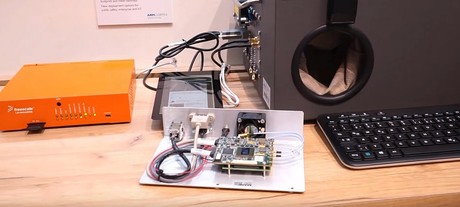5G-Crosshaul project a success

A flexible and dynamic transport solution for 5G communications has been developed by European partners.
A consortium of 20 companies and organisations has announced the successful completion of the European research project 5G-Crosshaul, coordinated by Universidad Carlos III de Madrid (UC3M).
The three-year effort has delivered a de facto concept for an integrated 5G transport network, a crucial step towards the real-world implementation of the future 5G communications system.
The 5G-Crosshaul consortium was selected in 2015 to develop a 5G transport network that would integrate backhaul and fronthaul, two typical segments of 4G networks.
In 5G, these two segments merge into what is known as crosshaul to enable a flexible and software-defined reconfiguration of all networking elements in a multitenant, service-orientated and unified management environment.
The 5G-Crosshaul transport network flexibly interconnects distributed 5G radio access and core network functions hosted on in-network cloud nodes. This configuration is achieved through the implementation of a control infrastructure coupled with a unified data plane, encompassing innovative high-capacity transmission technologies as well as novel deterministic-latency switch architectures.
The researchers say that, thanks to that integration, they can move a huge amount of data in a very short time, and can do it by controlling how long it takes to perform the process.
“It has been truly an honour to oversee one of the most ambitious 5G transport network research and development efforts to date,” said the Coordinator of the 5G-Crosshaul project, Arturo Azcorra, Professor at the Telematics Department of UC3M and Director of IMDEA Networks.
“The successful results of the 5G-Crosshaul project have advanced scientific knowledge and the international standardisation of 5G systems. They have ultimately contributed to an increase in Europe’s global competitiveness in 5G.”
The 5G-Crosshaul solution was demonstrated and validated through 18 experiments integrating multiple technology components from the project partners. Real-world trials took place at sites in Berlin, Madrid, Barcelona and Taiwan, and delivered sub-millisecond latency, tens of Gbps throughput, and proven energy and cost savings of up to 70%, depending on the deployment scenario.
The trials also demonstrated fast service deployment time in the order of minutes, taking advantage of SDN and NFV concepts.
“The 5G-Crosshaul project has delivered a novel transport network that provides overall resource optimisation and brings capital and operational expenditures to a reasonable return of investment,” said Xavier Costa, Head of 5G Networks R&D and Deputy General Manager of the Security & Networking R&D Division at NEC Laboratories Europe.
“The level of innovation achieved has set the stage to deliver the huge increase on the available bandwidth and the ultralow-latency required by the fifth generation of network technologies.”
Following the final project review, which was held at the R&D+i 5TONIC laboratory headquartered at IMDEA Networks and performed by independent experts appointed by the European Commission, the 5G-Crosshaul project was reported to “have fully achieved its objectives and milestones and delivered exceptional results with significant immediate or potential impact”.
The EU experts’ report also highlighted the production of 91 scientific publications in several prestigious journals, 74 presentations at international venues, 28 demonstrations (including several made at flagship events such as the Mobile World Congress) and 35 contributions to international standardisation bodies, amongst other results.
The report also noted that “several key innovations have been identified, and some of them have been mapped to products for exploitation. The project has so far registered five patent applications. Future exploitation plans are expected to emerge from the partners, outside the project umbrella and based on these innovations.”
“Throughout its lifetime, the 5G-Crosshaul project has successfully delivered 60-plus technological and informational contributions to the advancement of 5G standards,” said Paola Iovanna from Ericsson and the project’s Innovation Manager.
“The project produced radical technological innovations, several directly mapped to products, setting this project as one of the most groundbreaking and unique projects to date.”
“The project’s relevance will go well beyond its impressive track record of having brought together a diverse set of parties from all parts of the 5G ecosystem to deliver advanced research complemented with an innovative set of demonstrations,” said Thomas Deiß, from Mobile Networks, Nokia.
“In the ongoing and upcoming 5G rollouts — not just in the EU, but globally — the importance of the transport network must not be overlooked; 5G-Crosshaul made significant contributions towards that recognition, while keeping a holistic perspective on all technologies that are shaping the mobile transport networks of the future.”
The project received funding from the European Union’s Horizon 2020 Research and Innovation Programme.
Please follow us and share on Twitter and Facebook. You can also subscribe for FREE to our weekly newsletter and bimonthly magazine.
Originally published here.
RFUANZ report: setting the frequency for success in 2025
Last year brought a lot of internal change for RFUANZ, but the association has hit the ground...
ARCIA update: an extended event calendar for 2025
With the addition of Tasmanian events and a conference in Adelaide in September, 2025 will see...
ARCIA update: plans for 2025
ARCIA will be holding a mixture of workshop, conference and networking events in 2025, in the...





